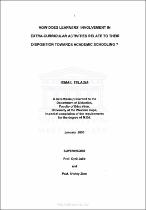| dc.contributor.advisor | Julie, Cyril | |
| dc.contributor.advisor | Zinn, Shirley | |
| dc.contributor.author | Teledia, Ismail | |
| dc.date.accessioned | 2023-05-15T13:25:17Z | |
| dc.date.available | 2023-05-15T13:25:17Z | |
| dc.date.issued | 2003 | |
| dc.identifier.uri | http://hdl.handle.net/11394/9979 | |
| dc.description | Magister Educationis - MEd | en_US |
| dc.description.abstract | This thesis focuses on an area of schooling, namely extra-curricular activity, that should form an integral part of the daily activities of a school. This unfortunately was not the case at the school where I am teaching. This school serves a working class community which is plagued by a number of social ills and where unemployment is rife. I will not debate the fact that the social upliftment of this community is a solution to the problem. It is my firm belief that the school should strike a balance between the academic program of the school and a program of extra-curricular activities. The learners at the school have become accustomed to the culture of violence, which is prevalent in their community. This has impacted negatively on the academic program of the school and the learners' disposition towards academic schooling. A basic assumption of this thesis is that extra-curricular activities form the basis for a positive impact on the disposition of the learners towards academic schooling. This study makes use of action research to explore some of the dimensions of academic schooling which are impacted on by extra-curricular activities. Data were collected from questionnaires, fieldnotes, interviews, learners' notes and the input from outside observers. Two action research cycles were employed. The major findings of the first cycle were zeroed in during the second cycle. These findings suggest that extra-curricular activities offer opportunities to; connect academic classroom work to questions and issues which; use their leadership and organizational skills in a practical and meaningful way; express their views and feelings about issues affecting their lives including the way they are taught and discriminatory practices still inherent in the way schools treat learners. Based on these findings, it is concluded that extra-curricular activities driven by teachers can be a vehicle for change towards more emancipatory schooling practices with the additional benefit of improving learners' disposition towards academic schooling. | en_US |
| dc.language.iso | en | en_US |
| dc.publisher | University of the Western Cape | en_US |
| dc.subject | Academic Spot | en_US |
| dc.subject | Extra-curricular | en_US |
| dc.subject | High school | en_US |
| dc.subject | Mitchell's Plain | en_US |
| dc.subject | Post-apartheid education | en_US |
| dc.title | How does learners involvement in extra-curricular activities relate to their disposition towards academic schooling? | en_US |
| dc.type | Thesis | en_US |
| dc.rights.holder | University of the Western Cape | en_US |

